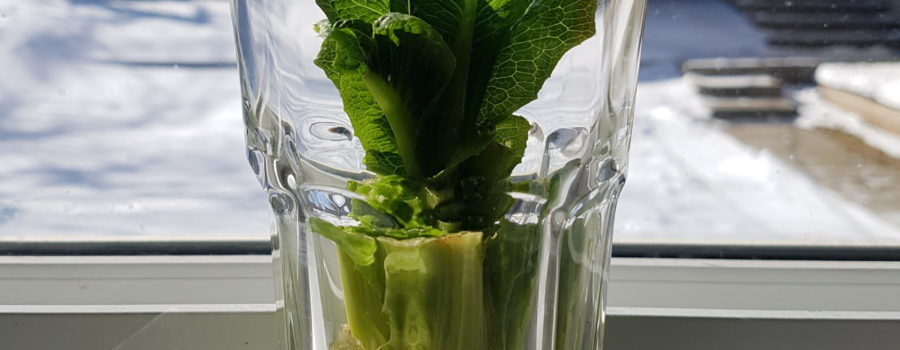Creative kitchens: helping meet global sustainability goals
With the arrival of spring, many of us are spring cleaning, planning our gardens, and starting our seeds. But what about those of us who don’t have a backyard, live in an apartment without a balcony or patio, or don’t have the physical ability to be on our hands and knees gardening all day? The good news is that there are many fun and creative ways to grow and prepare food.
Did you know that you can re-grow lettuce you bought in a grocery store? All you need to do is to save the bottom 2.5 to 3.5 cm of the lettuce stem and place it in a small dish of water! Remember to replace the water every day or two, and about two weeks later, you will have the perfect sandwich-sized helping of new lettuce. You will not have an unlimited supply with this method but seeing how much you can get from one stem can be a fun experiment, especially with children. You can also try this same method with celery or green onions. For green onions, you simply plant the white bulb and roots in a small pot with potting soil and you will soon have a never-ending supply! You can simply cut off what you need, and the plant will continue producing. This cuts down on food waste for those who struggle to use all of their store-bought green onions before they expire!
There are lots of other ways to be more creative in the kitchen while also minimizing waste. Many of our fridge contents have plenty of unexpected uses! Take leftover pickle juice, for example, which is actually a great meat tenderizer! The brine can also be used as a vinegar substitute for salads and dips, or to extend the life of vegetables that are about to go bad in your fridge. Adding some sliced-up beets to pickle brine and storing them in the fridge makes for an easy and colourful addition to salads and sandwiches. It’s important to note that you should never reuse pickle brine to make new pickles that
you intend to can and store in a pantry, however, and to always keep it in the fridge. The diluted brine also won’t last forever and can only be safely reused a limited number of times — so plan on using it sooner than later.
We have talked about the United Nation’s Sustainable Development Goals, or the SDGs, in many of our blog posts. Although they may seem intimidating or too globally spread for any one individual to do anything to help, when you get into the nitty-gritty of each of the 17 goals, they are actually broken down into many small, measurable goals that are easy for individuals to contribute to. By being creative in our kitchens, minimizing food waste, and doing things like re-growing our lettuce and celery, we are actually contributing to not only one, but several of the SDGs!
Helping meet the global goals can be fun if you are using your innovative spirit, and we encourage you to try out some fun, new kitchen adventures of your own!
Photo caption: Day three of romaine lettuce grown in a windowsill.
 Back to myNiagaraOnline
Back to myNiagaraOnline
































